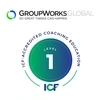International Coaching Federation
Penn GSE, in partnership with GroupWorks Global, offers an Executive Coaching Certificate that provides 60 credit hours (30 hours are synchronous and 30 hours are asynchronous) for those seeking the ICF ACC Credential.


